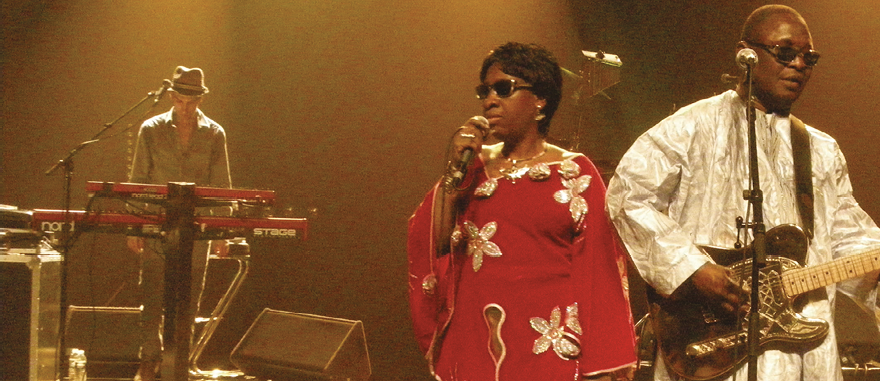When speaking of blind people in Africa, you tend to write dramatic stories of people who have no access to education or self-sufficiency, or – even worse – of all those people (especially children) who become blind because they weren’t treated in time. But there are also different stories from Africa, like the one about Amadou and Mariam, husband and wife, blind musicians who have become world-famous even though they come from Mali, a very poor country. They weren’t born blind, but became blind because the healthcare system didn’t work. Amadou became blind at 15 due to a congenital cataract, Mariam at 5 because of untreated measles.
They met in 1975 at the Institute for Blind Youth in Bamako, the capital of Mali. Here they met Idrissa Soumaoro, a well-known musician and music teacher specialized in teaching the blind. They both played in the Institute’s orchestra, called Eclipse. He was a guitarist and singer; she was a singer. They became very attached to one another, professionally and emotionally, and married in 1980.
Since then, their career has been a constant crescendo. They first became known in French-speaking western Africa, and then had a breakthrough in 2000: a successful album recorded with French-Spanish musician Manu Chao. Their music, based on Malian sounds and rhythms, mixed with new genres such as blues and rock, and so it became natural for them to work with artists from all over the world and take part in major music festivals. In 2006, together with a German singer, they sang the World Cup song; in 2009, when Barack Obama received the Nobel Peace Prize, they played on stage.
They are socially committed to protecting women in Congo and to efforts to achieve peace in that country. They worked to fight hunger in Africa (2011) and to spread African culture around the world, especially its most fascinating aspects: energy, the mix of peoples and languages, religious devotion.
In 2010, they published their autobiography, entitled "Away from the light of day," in which they talk about becoming blind and how they gradually accepted this situation thanks to music. They also talk about their life (as they usually do on TV interviews), about how they met, work together, and live together.

The most mysterious aspect (at least for us westerners) is their optimism and hope, despite all their problems. Their texts, mostly in French and Bambara, contain simple verses that say, more or less, the same as our pop songs, but perhaps even simpler and with stronger feelings: “If I don’t see you, I can’t do anything / I can’t do anything, can’t see anything / … my love, my darling” (I think of you), “Let’s make this world a better home / So no one will feel alone / Brotherhood, we’re a part of it / Spread hope…” (Netola). But it’s when you hear them sing that things change: those rhythms, those vocals bring happiness and lightheartedness.
Amadou and Mariam also went on tour with the Eclipse Orchestra, with performances completely in the dark, where audiences could use only their of sense hearing. Amadou explains, “It was our way to answer a question we’re asked all the time: how does a blind person hear music?”
Hear them on https://www.youtube.com/@amadouandmariam




.png)